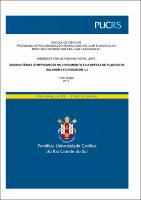| Share record |


|
Please use this identifier to cite or link to this item:
https://tede2.pucrs.br/tede2/handle/tede/7872| Document type: | Dissertação |
| Title: | Rizobactérias Streptomyces no crescimento e na defesa de plantas de Solanum lycopersicum (L.) |
| Author: | Leite, Andressa Von Wurmb Helrighel |
| Advisor: | Astarita, Leandro Vieira |
| First advisor-co: | Silva, Renata Medina da |
| Abstract (native): | O tomateiro (Solanum lycopersicum) é constantemente atacado por diversos patógenos, levando a perdas de produtividade. Dentre os principais patógenos, destaca-se o fungo Alternaria solani que causa a doença “pinta-preta” (“Early blight”), capaz de reduzir a produção e/ou levar à formação de frutos de baixa qualidade. Devido à grande susceptibilidade do tomateiro a patógenos, as práticas agrícolas incluem o uso intensivo de agroquímicos que resultam, frequentemente, em tomates com altos níveis residuais de pesticidas. A promoção do crescimento e da defesa vegetal utilizando microrganismos representa uma ferramenta para o manejo do tomateiro. Dentre as diversas rizobactérias com capacidade de modular o crescimento e a defesa vegetal, o gênero Streptomyces vem se destacando. Estas bactérias são capazes de sintetizar moléculas que interferem tanto diretamente no crescimento, como a auxina e a ACC desaminase, quanto indiretamente, através da produção de antibióticos e sideróforos. Pretendeu-se, neste trabalho, selecionar isolados de Streptomyces (CLV04, CLV05 e CLV07) com capacidade de promover a germinação e o crescimento de plantas de tomate, além de aumentar a resistência vegetal contra A. solani. Os resultados demonstram que o CLV07 causou retardo na germinação, mas não reduziu a taxa final de germinação. Apesar das rizobactérias CLV04, CLV05 e CLV07 produzirem elevados níveis de auxina, elas causaram a redução do crescimento tanto da raiz quanto da parte aérea de plântulas de tomate cultivadas in vitro. O CLV07 foi eficiente na promoção da defesa de plantas de tomate contra A. solani. Todas as rizobactérias apresentaram antagonismo por competição, reduzindo o crescimento do micélio do fungo A. solani. Considerando todos os resultados, as diferentes bactérias Streptomyces foram prejudiciais à germinação e ao crescimento inicial de plântulas de tomate. Desta forma, não é recomendável a utilização destas bactérias em sementes e plântulas jovens. Contudo, o CLV07 apresenta potencial para ser utilizado para a indução de resistência de plantas de tomate contra o patógeno A. solani. |
| Abstract (english): | Tomato (Solanum lycopersicum) cultures are frequently attacked by many pathogens, leading to yield losses. Among the pathogens, the fungus Alternaria solani (“Early blight” disease) can cause significant yield reductions and decreases the fruit quality. Due to the high susceptibility of tomato to fungal pathogens, the agricultural practices include the intensive use of agrochemicals, which may result in fruits with high levels of residual pesticides and higher production costs. The promotion of plant defense system represents an additional tool for disease control and plant growth management. Some rhizobacteria have been shown the ability to affect plant development and modulate plant defense against pathogens. Among those bacteria, the genus Streptomyces is able to synthesize molecules that directly interfere with growth, through auxin and ACC deaminase production, and indirectly, through antibiotics and siderophores synthesis. The aim of this work was to select Streptomyces (CLV04, CLV05 and CLV07) with the ability to promote seed germination and plant growth, as well as improve tomato plant resistance against A. solani. Results showed that CLV07 delayed the initial seed germination, but it did not impair the final germination process. However, CLV04, CLV05 and CLV07 reduced the early root and shoot growth. All these rhizobacteria produced high auxin levels. CLV07 was efficient for inducing plant resistance against A. solani. Furthermore, all CLVs showed antagonism by competition, decreasing the A. solani growth. Taking together all results, Streptomyces tested were deleterious for seed and initial plant growth, but CLV07 showed a potential to be used for inducing plant resistance. However, the inoculation of these rhizobacteria on seeds is not recommended. |
| Keywords: | PGPR Biocontrole Alternaria Solani Tomate |
| CNPQ Knowledge Areas: | CIENCIAS BIOLOGICAS::BIOLOGIA GERAL |
| Language: | por |
| Country: | Brasil |
| Publisher: | Pontifícia Universidade Católica do Rio Grande do Sul |
| Institution Acronym: | PUCRS |
| Department: | Escola de Ciências |
| Program: | Programa de Pós-Graduação em Biologia Celular e Molecular |
| Access type: | Acesso Aberto |
| Fulltext access restriction: | Trabalho será publicado como artigo ou livro |
| Time to release fulltext: | 12 meses |
| Date to release fulltext: | 07/03/2019 |
| URI: | http://tede2.pucrs.br/tede2/handle/tede/7872 |
| Issue Date: | 25-Aug-2017 |
| Appears in Collections: | Programa de Pós-Graduação em Biologia Celular e Molecular |
Files in This Item:
| File | Description | Size | Format | |
|---|---|---|---|---|
| DIS_ANDRESSA_VON_WURMB_HELRIGHEL_LEITE_COMPLETO.pdf | ANDRESSA_VON_WURMB_HELRIGHEL_LEITE_DIS | 1.55 MB | Adobe PDF |  Download/Open Preview |
Items in DSpace are protected by copyright, with all rights reserved, unless otherwise indicated.




